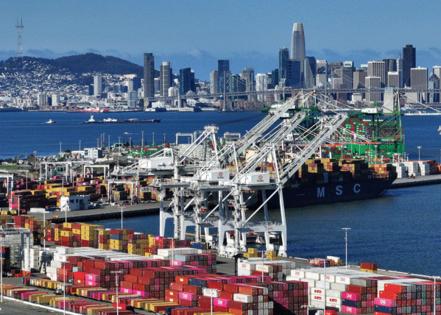Editorial: The trade war is coming for your plumbing
Published in Op Eds
A fair summary of the president’s kaleidoscopic vision for the American economy might go something like this: Workers should have rewarding manufacturing jobs and live comfortably in affordable homes with great showers. Too bad all of those goals are being disrupted by a competing White House priority — a seemingly endless renegotiation of trade agreements.
Take plumbing manufacturers, the makers of those showerheads that an April 9 executive order described as “weak and worthless.” The president hopes to revive the industry by freeing it from regulations imposed by his predecessor. That’s fine as far as it goes — inevitably, the effort is called “restoring shower freedom” — but any such reform will be undermined by the administration’s new tariffs.
In fact, this humble industry exemplifies exactly how damaging a trade war can be.
Plumbing manufacturers may not have the political cachet of tech companies or automakers. But they employ more than 200,000 people in 41 states and account for $13 billion in wages. (And much more when accounting for associated suppliers and retailers.) They’re an essential element of the homebuilding industry. And, like many manufacturers, they’ve built intricate global supply chains that push down prices thanks to the wonders of comparative advantage.
With the administration now threatening a 10% “baseline” tariff on nearly every US trading partner, and imposing an average duty of 124% on Chinese imports, this salutary ecosystem is in danger of breaking down. Shifting suppliers isn’t quick or easy. American plumbing products are subject to certification requirements, which means imported components — such as valves and handles — must also be up to standard. In all likelihood, that will mean more delays and higher prices.
That, in turn, will trickle through to housing. Plumbing contributes about 8% of the cost of building a home. The administration’s goal of expanding the supply of affordable homes will suffer from the added costs on plumbing and other building materials such as lumber and steel. The new tariffs are likely to increase the cost of a home by nearly $11,000, according to an April survey of homebuilders.
Creative sourcing might ease these challenges to an extent. But as pragmatic businesses, some manufacturers had already moved production outside of China in response to the tariffs imposed during the president’s first term. Now they find themselves questioning those investments as they face sudden import taxes on their new locations. Planning ahead seems foolish.
Can’t companies just make toilets and showers in the US? Perhaps, but it will take time to scale up the supply of materials and manufacturing capacity. Copper, for instance, is a popular material for pipes because of its durability and antibacterial properties, but China dominates refining of the metal. The White House is studying ways to address the domestic supply shortfall, including potentially imposing tariffs on imports. Yet substitutes, such as pipes made of polyvinyl chloride, increasingly come from overseas — and thus will also be needlessly expensive, thanks (once again) to tariffs.
It’s true that US manufacturers could use a boost from policymakers. But as the toilet-making business shows, tariffs are about the worst way to do so. Far better to focus on growth: End America’s punitive tax treatment of investment spending. Follow through on the administration’s promises to cut red tape. Expand high-skilled immigration, provide work-based learning programs, and offer savings accounts for certification exams and credentials to help build a stronger labor force.
But don’t raise punitive taxes on American companies. Surveys show that manufacturers, homebuilders and other business leaders — the supposed beneficiaries of this policy — overwhelmingly oppose the new tariffs. Consumers likewise hate the idea. They can all see what the White House evidently can’t: No one wins a trade war.
____
The Editorial Board publishes the views of the editors across a range of national and global affairs.
©2025 Bloomberg L.P. Visit bloomberg.com/opinion. Distributed by Tribune Content Agency, LLC.




























































Comments